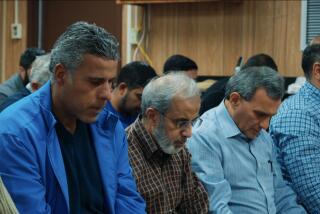The man behind the Manhattan mosque
- Share via
Reporting from New York — When protesters flooded Lower Manhattan last Sept. 11 to vent about a planned Islamic cultural and prayer center, few knew the obscure New York businessman behind the project. Squadrons of police had to be deployed to control the angry crowds wielding bullhorns and placards, yet nobody cried out the name of Sharif El-Gamal.
The furor over what opponents call the “ground zero mosque” has receded for now, and plans for the $100-million project continue to move forward. The driving force remains the relentless El-Gamal, a Brooklyn-born college dropout who makes up in tenacity what he lacks in polish.
With light blue eyes and reddish, curly hair, snazzy suits and upwardly mobile ambitions, El-Gamal comes across like a typical New York mashup of cultures and religions. His first real estate partner was a Hasidic Jew, and even now when he’s searching for a perfect expression, he’s as likely to use Yiddish as Arabic.
On a recent Friday afternoon, El-Gamal, 38, paced around his sunny Manhattan office describing like an excited teenager how he got into wheeling and dealing property.
Suddenly a voice crackled from his computer.
It was a muezzin’s call, programmed to remind him to pray five times a day. But instead of dropping to his knees in front of his desk, as he usually does, he headed for his buildings at 45-51 Park Place, now the most controversial prayer space in America.
By the time El-Gamal arrived, hundreds of Muslim men and a handful of women were already shoeless and murmuring prayers on the first floor of the crumbling buildings. After a brief service, almost every congregant offered a swab of saliva: The community is seeking a bone-marrow match for a Pakistani “brother” who has cancer.
“Pretty dangerous stuff,” El-Gamal said dryly, before swabbing his own cheek and slipping into a subway train to return to his office.
Every Friday for almost two years, the site has served Muslims who work in nearby government offices, as well as the occasional hot dog vendor or construction worker who drifts over from the former World Trade Center site 2 1/2 blocks away. This went virtually unnoticed even after a story about the planned center, called Park51, appeared on the front page of the New York Times in December 2009.
But last May, after a car bombing attempt in Times Square by a Muslim American, opposition to Park51 began to mushroom, fueled by critics on the Internet and cable news, victims’ relatives and conservative politicians. They denounced it as an insult to the memory of the nearly 3,000 people killed on Sept. 11, 2001, in the name of Islam.
Polls showed that most New Yorkers didn’t want a mosque nearby even as Mayor Michael R. Bloomberg defended Muslims’ right to pray where they choose, saying, “There is no neighborhood in this city off-limits to God’s love and mercy.”
Although most of the opposition focused on the project’s spiritual leader, Imam Feisal Abdul Rauf, El-Gamal also gained attention, including a profile on “60 Minutes.”
Some labeled him slimy, greedy, arrogant and dishonest.
Pamela Geller, a conservative activist who led opposition through her blog, Atlas Shrugs, said El-Gamal was a “front man” for the money behind the project and for “Islamic supremacists” who believe in the tradition of erecting a mosque near the site of a war victory.
“It’s been sold as a mosque of healing when it has the opposite effect,” Geller said recently.
Timothy Brown, a firefighter who lost 93 friends on Sept. 11 and is suing to block the project, called El-Gamal a “bad apple.”
“For him to keep shoving this down the families’ throats, what does it show you about this man?” Brown said.
But El-Gamal has kept going.
He applied for nonprofit status for the project, and sought a $5-million grant from a public agency created to heal the area. He is recruiting Muslim and non-Muslim members for separate boards for the prayer space and community center, and has begun negotiating with banks for financing.
“My brother has always been an aggressive person but always a good person,” said Sammy El-Gamal, who recalled how Sharif would win his allowance money during childhood backgammon games, but usually gave it back. “He’s just persistent. When he wants something, when he believes in something, he doesn’t give up.”
When Abdul Rauf signaled in January that he would accept relocating the center farther from the site, El-Gamal nudged him aside.
Even before they parted ways, Abdul Rauf had left most of the responsibilities for the project to El-Gamal while he concentrated on a broader interfaith message. “Sharif did the design concept, the floor plan,” Abdul Rauf said. “He pushed it ahead.”
Back at his office, El-Gamal’s face reddened as he recounted efforts to get him to retreat. At the height of the controversy even Donald Trump chimed in, offering to pay him a bonus to move.
“Are we supposed to move so we can create a Muslim-free zone, Muslim-free blocks?” El-Gamal asked heatedly. “That makes no sense. … What happened on 9/11 was a criminal act of mass murder that had nothing to do with my people or my community. And it’s about time we put a clear line in the sand.”
It’s a line he has made using all his dexterity as a quintessential striving New Yorker.
He was born in a Methodist hospital to a Polish Catholic mother and Egyptian Muslim father who divorced over religion. After his mother died of cancer when he was 5, El-Gamal and his brother lived with their father, an immigrant who was a rising Chemical Bank executive.
He’s lived in different parts of New York as well as abroad — in Liberia briefly as a toddler and in Egypt from ages 11 to 18, with a one-year break on Long Island, where he played high school football.
“We ultimately went to Egypt because my father wanted us to understand our identity,” El-Gamal said. “I went kicking and screaming.”
In Alexandria, El-Gamal spoke English and played water polo at an international school run by Americans, while at home he spoke Arabic and was immersed in Egyptian culture. The family prayed at elegant mosques and fasted for Ramadan.
Memories of those mosques and his exposure to the Muslim world would stir his yearning for a dignified place to pray and commune in New York.
El-Gamal returned to the United States for college, but dropped out to work for a financial broker. “I was really lost, and in part it was cultural confusion. You’re American but at the same time you don’t have your community,” he said.
Before he married and settled down, El-Gamal admitted, he led a fast Manhattan life that included a DUI and disorderly conduct arrests. He eventually found his calling in real estate development.
On the morning of the World Trade Center attack, like hundreds of New Yorkers, he felt compelled to rush to the scene to help. Yet in the months that followed, El-Gamal became enraged as he saw all Muslims being held accountable for the attack by 19 radical Islamists.
“I really wanted to understand my identity, thinking, ‘How dare people say that about me and my religion,’ ” he said.
He started going to a prayer center located for decades in a second-floor loft space on Warren Street, also near the attack site.
“Muslims had been praying for years on those streets near the World Trade Center,” he said. “But I was really shocked that this 5,000-square-foot loft where the paint was peeling, carpets were dirty, bathrooms inadequate was the representation of my religion in Lower Manhattan. … The mosques I’d been used to were magnificent houses that you’d be fascinated by even if you were non-Muslim.”
One Friday in 2005 he heard a sermon by Abdul Rauf in a tiny prayer space on West Broadway.
“It was almost like I was now listening to a professor, in perfect English, giving something my soul had longed for,” El-Gamal said. He told Abdul Rauf, “It’s not really fair that only 70 people get to hear you.”
That same year, after a lengthy search that led him to dozens of potential sites — all rejected by the Warren Street elders — El-Gamal found the Park Place buildings.
They had been vacant since the landing gear from one of the Sept. 11 planes torpedoed through the roof. El-Gamal’s plan calls for a 13-story community center, run by Muslims but open to all, with a theater, pool, day-care center, culinary institute and prayer space. El-Gamal and Abdul Rauf said it would be a way of pushing back against the image of Muslims as extremists.
After four years of negotiations, El-Gamal bought the property for $4.8 million.
“At that point I wanted to — how do you say in Yiddish, ‘create a marriage’? — oh, yeah, make a shidduch between Imam Rauf and the beautiful people from Warren Street,” El-Gamal said.
That never quite happened. Some congregants flocked to the first floor of Park Place while others rented space nearby. Today, four mosques exist within walking distance of the former World Trade Center.
With the 10th anniversary of Sept. 11 just months away, El-Gamal is preparing for renewed criticism. (Said Geller: “We will be there on the streets if they grant taxpayer money from a 9/11 fund to build this ground zero mosque.”)
But El-Gamal has also set his sights beyond — to a groundbreaking in four to five years, and to accompanying his two young daughters, who take swim lessons at a Jewish center on the Upper West Side, where he lives, to the pool on Park Place.
“I have been trying for eight years now to help my community,” El-Gamal said. “It’s just not in my DNA to give up.”
More to Read
Sign up for Essential California
The most important California stories and recommendations in your inbox every morning.
You may occasionally receive promotional content from the Los Angeles Times.













